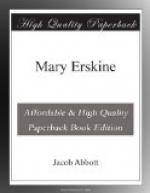Mrs. Bell rose from her bed, and went to the crib to see if Mary Bell was safe. She found her sleeping quietly. Mrs. Bell drew the crib out a little way from the wall, supposing that she should thus put it into a somewhat safer position. Then she lighted a large lamp. Then she closed all the shutters of the room, in order to shut out the lightning. Then she went to bed again, and tried to go to sleep. But she could not. She was thinking of Mary Erskine, and endeavoring to form some plan for her future life. She could not, however, determine what it was best for her to do.
In the morning, after breakfast, she sat down at the window, with her knitting work in her hand, looking very thoughtful and sad. Presently she laid her work down in her lap, and seemed lost in some melancholy reverie.
Mary Bell, who had been playing about the floor for some time, came up to her mother, and seeing her look so thoughtful and sorrowful, she said,
“Mother, what is the matter with you?”
“Why, Mary,” said Mrs. Bell, in a melancholy tone, “I was thinking of poor Mary Erskine.”
“Well, mother,” said Mary Bell, “could not you give her a little money, if she is poor? I will give her my ten cents.”
[Illustration: MRS. BELL.]
Mary Bell had a silver piece of ten cents, which she kept in a little box, in her mother’s room up stairs.
“Oh, she is not poor for want of money,” said Mrs. Bell. “Her husband made his will, before he died, and left her all his property.”
“Though I told Mr. Keep about it last night,” continued Mrs. Bell, talking half to herself and half to Mary, “and he said the will was not good.”
“Not good,” said Mary. “I think it is a very good will indeed. I am sure Mary Erskine ought to have it all. Who should have it, if not she?”
“The children, I suppose,” said her mother.
“The children!” exclaimed Mary Bell. “Hoh! They are not half big enough. They are only two babies; a great baby and a little one.”
Mrs. Bell did not answer this, nor did she seem to take much notice of it, but took up her knitting again, and went on musing as before. Mary Bell did not understand very well about the will. The case was this:
The law, in the state where Mary Erskine lived, provided that when a man died, as Albert had done, leaving a wife and children, and a farm, and also stock, and furniture, and other such movable property, if he made no will, the wife was to have a part of the property, and the rest must be saved for the children, in order to be delivered to them, when they should grow up, and be ready to receive it and use it. The farm, when there was a farm, was to be kept until the children should grow up, only their mother was to have one third of the benefit of it,—that is, one third of the rent of it, if they could let it—until the children became of age. The amount of the other two thirds was to be kept for them. In respect to all movable property, such as stock and tools, and furniture, and other things of that kind, since they could not very conveniently be kept till the children were old enough to use them, they were to be sold, and the wife was to have half the value, and the children the other half.




